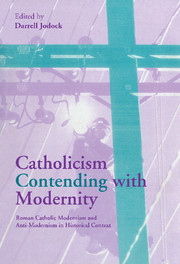 Catholicism Contending with Modernity
Catholicism Contending with Modernity Book contents
- Frontmatter
- Contents
- List of contributors
- Acknowledgments
- List of abbreviations
- Note on the text
- Introduction I: The Modernist crisis
- Introduction II: The Modernists and the anti-Modernists
- PART I THE LATE NINETEENTH-CENTURY SETTING OF MODERNISM AND ANTI-MODERNISM
- PART II MAURICE BLONDEL AND ALFRED LOISY IN FRANCE
- 4 Seeking transcendence in the modern world
- 5 Blondel's Action and the problem of the University
- 6 The politics of Loisy's Modernist theology
- 7 Innovation and biblical interpretation
- PART III FRIEDRICH VON HÜGEL AND MAUDE PETRE IN ENGLAND
- PART IV SOCIAL MODERNISM AND ANTI-MODERNISM IN FRANCE
- Conclusion
- Index
6 - The politics of Loisy's Modernist theology
Published online by Cambridge University Press: 30 October 2009
- Frontmatter
- Contents
- List of contributors
- Acknowledgments
- List of abbreviations
- Note on the text
- Introduction I: The Modernist crisis
- Introduction II: The Modernists and the anti-Modernists
- PART I THE LATE NINETEENTH-CENTURY SETTING OF MODERNISM AND ANTI-MODERNISM
- PART II MAURICE BLONDEL AND ALFRED LOISY IN FRANCE
- 4 Seeking transcendence in the modern world
- 5 Blondel's Action and the problem of the University
- 6 The politics of Loisy's Modernist theology
- 7 Innovation and biblical interpretation
- PART III FRIEDRICH VON HÜGEL AND MAUDE PETRE IN ENGLAND
- PART IV SOCIAL MODERNISM AND ANTI-MODERNISM IN FRANCE
- Conclusion
- Index
Summary
An introverted scholar with few outside interests, Alfred Loisy (1857–1940) wrestled with questions of the Catholic faith based on his reading of the Bible and other biblical critics. However, Loisy was not just an intellectual working out religious ideas in a vacuum; rather, he was a Roman Catholic priest with a personal commitment to the church and a high regard for it as an important institution in French life. His own experience of a crisis of faith and the more general alienation from the church in France therefore shaped his work in profound ways. As a biblical critic and historian of Christian origins, Loisy emphasized the intellectual roots of this alienation, and subsequent students of his thought have tended to follow his lead. I will argue, however, that Loisy also considered politics as a contributing factor to the religious crisis and that politics therefore played an important role in his theology.
This essay consists of two sections. In the first, I will discuss the place of politics in Loisy's view of the theological task. At a time when the church espoused an anachronistic political theory, theologians, he believed, had to translate Christian truth into modern terms. This translation necessarily included relinquishing the church's political pretensions, which, in Loisy's view, were clearly exposed as unwarranted by contemporary events. The second section of the essay will review particular political questions and their relationship to Loisy's theology. Loisy formulated his theology in the context of political discussions about moral education in the newly secularized primary school system.
- Type
- Chapter
- Information
- Catholicism Contending with ModernityRoman Catholic Modernism and Anti-Modernism in Historical Context, pp. 169 - 190Publisher: Cambridge University PressPrint publication year: 2000
- 1
- Cited by


